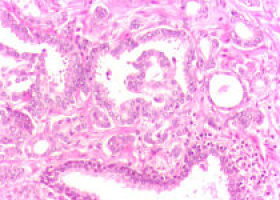
Immune cells may be responsible for drug resistance in melanoma patients, according to research1 published in Cancer Discovery.
Cancer Research UK scientists at The University of Manchester found that chemical signals produced by a type of immune cell, called macrophages, also act as a survival signal for melanoma cells.
When the researchers blocked the macrophages’ ability to make this signal – called TNF alpha – melanoma tumours were much smaller and easier to treat.
When melanoma patients are given chemotherapy or radiotherapy it causes inflammation, increasing the number of macrophages in the body – and raising the levels of TNF alpha.
This research suggests that targeting this chemical ‘survival signal’ could lead to new ways to treat the disease.
Dr Claudia Wellbrock, study author and Cancer Research UK scientist at The University of Manchester and member of the Manchester Cancer Research Centre, said: “This discovery shows that immune cells can actually help melanoma cells to survive. Particularly when patients are receiving treatment, the immune cells produce more of the survival signal, which makes treatment less effective. So combining standard treatment with immunotherapy at the same time could potentially provide more long-lasting and effective treatments to increase survival.”
Melanoma is the most deadly form of skin cancer with around 13,300 people diagnosed in the UK each year.
Rates of the disease have increased more than fivefold since the mid 1970s.
Professor Richard Marais, director of the Cancer Research UK Manchester Institute and co-author of the study, said: “Melanoma is particularly difficult to treat as many patients develop resistance to standard treatment within a few years. This research provides a key insight into why this is the case.
“Drugs which block this ‘survival signal’ have already been developed and using these along with standard treatment may be a promising new approach for melanoma patients.”
References
Smith et al. The immune-microenvironment confers resistance to MAP kinase pathway inhibitors through macrophage-derived TNFα (2014). Cancer Discovery.
Source: Cancer Research UK